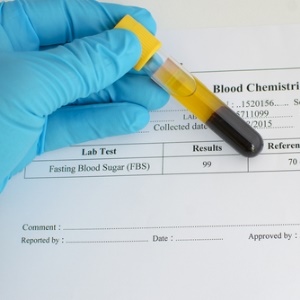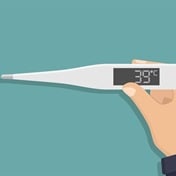
Fasting blood glucose (FBG) is a blood test done to measure the amount of glucose present in the blood after an eight-hour fast. It is thus not affected by recent food intake.
Purpose of the test
The values obtained can
- diagnose whether a person has diabetes mellitus (DM), or
- be used to monitor glucose control in those already known to have DM.
Most carbohydrates in the diet are converted into glucose. If the body's ability to use glucose is impaired, the levels in the blood rise, and the state of DM may exist. Establishing the diagnosis is important, because the complications of untreated DM can be fatal.
Once diagnosed, treatment must be monitored to ensure optimum glucose control: good control delays the onset, and reduces the impact of, possible complications. Regular FBGs will show the effectiveness of treatment, or the need to change therapy.
FBG measurement in newborn babies and pregnant women is a different category and must be interpreted by a specialist.
FBG may also be used as part of the investigation of other conditions associated with abnormalities in glucose metabolism or fluctuations in glucose levels, like:
- adrenal gland disorders,
- delirium/dementia,
- seizures,
- hormone-secreting tumours,
- transient ischaemic attacks, and
- trauma, heart attack and surgery.
How the test is done
The patient must have nothing to eat or drink for at least eight hours before the blood sample is taken.
The normal routine for blood sampling is followed: a suitable vein is identified, and a tourniquet applied to distend the vein for puncture. The skin over the vein is antiseptically cleaned. A sterile needle and syringe are used to draw about 10ml of blood from the vein, the tourniquet is removed, the needle withdrawn, and the puncture site compressed for a few minutes, then covered with a clean dressing.
The blood sample is usually sent to a laboratory for analysis. A hand-held glucometer may also be used, provided that it is correctly calibrated and has verifiable accuracy.
Normal Values
A FBG value of >7.0 mmol/L is diagnostic of DM, except in neonates or pregnancy.
Abnormal results
Results above 7mmol/L - called hyperglycaemia - could be due to a variety of causes, including:
- Diabetes mellitus,
- Pre-diabetes,
- Too low a dose of insulin in a known diabetic,
- Hyperthyroidism,
- Rare conditions such as acromegaly, Cushing syndrome, phaeochromocytoma, or pancreatitis, or
- Drugs:
- Steroids,
- Diuretics,
- Some antipsychotics and antidepressants,
- Phenytoin, or
- Excess paracetamol use.
Very low readings (hypoglycaemia) may be associated with:
- Too much insulin used for treating DM,
- Insulinoma (rare tumour),
- Hypothyroidism,
- Starvation/excess dieting, or
- Drugs:
- Alcohol,
- Anti-diabetic medication, or
- Some lipid-lowering agent.
Associated risks
The risks of the test are those of drawing blood:
- Bleeding from the puncture site,
- Bruising,
- Haematoma formation (lump due to bleeding under the skin), or
- Infection - important in diabetics.
Other tests
If the results of the FBG indicate DM or a pre-diabetic state, a formal glucose tolerance test (GTT) is mandatory.
(Dr A G Hall)




 Publications
Publications
 Partners
Partners











